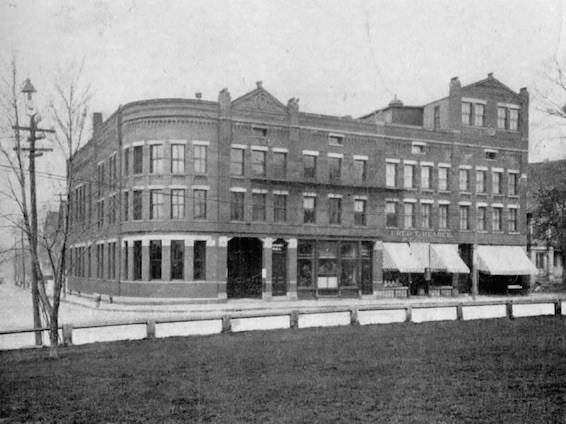Difference between revisions of "Monitor"
(→PAST MASTERS) |
(→INSTALLATION, DECEMBER 1907) |
||
| Line 649: | Line 649: | ||
''From New England Craftsman, Vol. III, No. 4, January 1908, Page 141:'' | ''From New England Craftsman, Vol. III, No. 4, January 1908, Page 141:'' | ||
| − | The officers of Monitor Lodge, Waltham, Mass.. were installed by Wor. [http://masonicgenealogy.com/MediaWiki/index.php?title=GMMJohnson Melvin M. Johnson], Grand Marshal of the Grand Lodge of Mass. Monday. December 9, assisted by Past Master Wor. [http://masonicgenealogy.com/MediaWiki/index.php?title=MAGLWFarrington William M. Farrington as Marshal. | + | The officers of Monitor Lodge, Waltham, Mass.. were installed by Wor. [http://masonicgenealogy.com/MediaWiki/index.php?title=GMMJohnson Melvin M. Johnson], Grand Marshal of the Grand Lodge of Mass. Monday. December 9, assisted by Past Master Wor. [http://masonicgenealogy.com/MediaWiki/index.php?title=MAGLWFarrington William M. Farrington] as Marshal. |
The new officers are: Charles N. Brodick, W. M.; Arthur H. Paul, S. W.; Charles J. Shepard, J. W.; Luman N. Hall (P. M.) Treasurer; Frank O. Locke (P. M.), Secretary: Rev. Robert Murray, Chaplain; George M. Bates, Marshal; Louis A. Phillips, S. D.; Fred C. Tebbetts. J. D.; Frederick W. Sawyer, S. S.; Arthur I. Teele, J. S.: Fred L. Caswell, Organist; Charles H. Parks, Tyler. | The new officers are: Charles N. Brodick, W. M.; Arthur H. Paul, S. W.; Charles J. Shepard, J. W.; Luman N. Hall (P. M.) Treasurer; Frank O. Locke (P. M.), Secretary: Rev. Robert Murray, Chaplain; George M. Bates, Marshal; Louis A. Phillips, S. D.; Fred C. Tebbetts. J. D.; Frederick W. Sawyer, S. S.; Arthur I. Teele, J. S.: Fred L. Caswell, Organist; Charles H. Parks, Tyler. | ||
Revision as of 18:09, 11 November 2021
Contents
- 1 MONITOR LODGE
- 2 REFERENCES IN GRAND LODGE PROCEEDINGS
- 2.1 ANNIVERSARIES
- 2.2 VISITS BY GRAND MASTER
- 2.3 BY-LAW CHANGES
- 2.4 HISTORY
- 2.5 OTHER
- 2.6 EVENTS
- 2.6.1 INSTALLATION, JANUARY 1847
- 2.6.2 INSTALLATION, JANUARY 1848
- 2.6.3 HALL DEDICATION, OCTOBER 1856
- 2.6.4 INSTALLATION, JANUARY 1858
- 2.6.5 OFFICER LIST, DECEMBER 1858
- 2.6.6 OFFICER LIST, JANUARY 1860
- 2.6.7 HALL DEDICATION, MAY 1865
- 2.6.8 INSTALLATION, JANUARY 1878
- 2.6.9 INSTALLATION, DECEMBER 1906
- 2.6.10 INSTALLATION, DECEMBER 1907
- 2.6.11 PRESENTATIONS, FEBRUARY 1908
- 2.6.12 RECEPTION, MARCH 1914
- 2.6.13 INSTALLATION, DECEMBER 1921
- 2.7 GRAND LODGE OFFICERS
- 2.8 OTHER BROTHERS
- 2.9 DISTRICTS
- 2.10 LINKS
MONITOR LODGE
Location: Waltham
Chartered By: Samuel P.P. Fay
Charter Date: 12/13/1820 III-323
Precedence Date: 12/13/1820
Current Status: merged with Isaac Parker and Waltham Lodges to form Waltham Triad Lodge, 06/10/1988.
PAST MASTERS
- Joshua Swan, 1820-1822 ©
- Robert Smith, 1822
- Isaac Bemis, Jr., 1823 ©
- Abijah Whitney, 1824 ©
- Lowell Adams, 1825 ©
- Timothy Davis, 1826, 1827 ©
- Ephraim Allen, 1828-1832 ©
- DARK 1832-1846
- Isaac Parker, 1846-1858 ©
- Marcus A. Moore, 1859; © Mem
- Henry Mulliken, 1860, 1861 ©
- Hiram M. Britton, 1862, 1863
- Charles H. Houghton, 1864 ©
- Samuel O. Upham, 1865, 1866©
- Charles A. Welch, 1867-1869 ©
- Louis A. Felix, 1869 ©
- Albert T. Bacon, 1870, 1871 ©
- H. W. Hartwell, 1872, 1873©
- Luman N. Hall, 1874-1876 ©
- William Shakespeare, 1877, 1878 ©
- Nathan Warren, 1879, 1880 ©
- Rufus G. Brown, 1881, 1882 ©
- William H. Anderson, 1883, 1884 ©
- Charles W. Parmenter, 1885, 1886
- James W. Follet, 1887, 1888 ©
- Frank K. Porter, 1889, 1890; © Mem
- Alonzo S. Locke, 1891, 1892 ©
- Jason N. Greenwood, 1893, 1894 ©
- Clarence Tebbets, 1895, 1896 ©
- Arthur P. Smith, 1897, 1898 ©
- Fred P. Rutter, 1899, 1900 ©
- Melvin M. Johnson, 1901, 1902 ©
- Frank O. Locke, 1903, 1904 ©
- Robert B. Johnson, 1905, 1906 ©
- Charles N. Brodrick, 1907, 1908 ©
- Arthur H. Paul, 1909, 1910 ©
- Charles J. Shephard, 1911, 1912 ©
- Louis A. Phillips, 1913, 1914 ©
- Fred C. Tebbets, 1915, 1916 ©
- Fredrick W. Sawyer, 1917 ©
- Charles F. Bliss, 1918 ©
- John M. Gibbs, 1919 ©
- Howard S. Hatch, 1920 ©
- H. Alton Roark, 1921; N
- Ernest W. Burckes, 1922
- Albert W. Bullock, 1923
- J. Allan Hurd, 1924
- Lyman H. Matthews, 1925
- Robert E. Larcome, 1926
- John Thompson, 1927
- Adelman E. Clarke, 1928
- Edwin Y. Willey, 1929
- Harry A. Starr, 1930; N
- Paul W. Bartel, 1931
- J. Sidney Stone, 1932
- Austin S. Hale, 1933
- Benjamin S. Battys, 1934
- J. Leslie Campbell, 1935
- Lawrence A. Brewer, 1936
- Raymond L. Clapp, 1937
- Harold B. Colpitts, 1938
- Reginald L. Cahill, 1939
- W. F. Harrington, Jr., 1940
- Frank J. Mooney, Jr., 1941
- Herbert S. Morang, 1942
- S. Alger M. Lewis, 1943
- Raymond S. Dolber, 1944
- Leslie H. Lewis, 1945
- Angie W. Johnson, 1946
- Carl O. Christianson, 1947
- Russell P. Wentworth, 1948
- Maurice L. Upham, 1949
- Andrew B. Robertson, 1950
- Louis J. Kirsch, Jr., 1951
- Victor C. Harnish, 1952
- E. Fay Bishop, 1953
- Clyde F. Joslyn, Jr., 1954, 1986
- Paul D. Wentworth, 1955
- Harold A. Downing, 1956
- Harlan B. Tewksbury, 1957
- Robert J. Larcome, 1958
- Paul B. McKenney, 1959
- Henry M. Ferrick, 1960
- William J. Milesky, 1961
- Bernard P. Alden, 1962
- Robert W. Phillips, Jr., 1963
- Brenton E. Tyler, Jr., 1964; N
- Henry W. Lingley, 1965
- Donald R. Leser, 1966
- Louis J. Kirsch, III, 1967
- Frank J. Mooney, III, 1968
- Robert S. Douthart, Jr., 1969
- Robert H. Bauer, 1970
- Samuel Scheinfeld, 1971
- J. Alden Wentworth, II, 1972
- Garnett D. Bailey, 1973
- George E. Mitchell, 1974
- Donald K. Miller, 1975
- Richard A. McKenzie, 1976
- Ernest McKenzie, Jr., 1977
- Wallace W. Spracklin, 1978
- Edward S. Cobb, 1979
- Frederick H. Robinson, 1980
- Paul Travis, 1981
- Walter M. Bailey, 1982
- Richard S. Milesky, 1983
- Loren L. Jenkins, 1984
- Warren W. Rand, 1985
- Robert L. Cook, 1987, 1988
PICTURES FROM THE 1920 HISTORY
The following pictures appear in the Centenary History of the Lodge published in 1920. Past Masters with pictures below are marked with a © above. (As more pictures are available, they can be added here.)
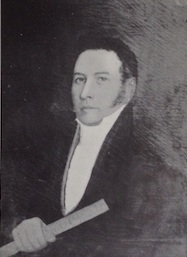
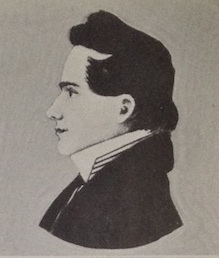
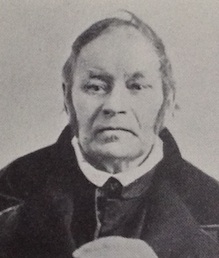
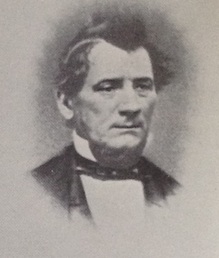
Joshua Swan, Isaac Bemis, Jr., Abijah Whitney, Lowell Adams
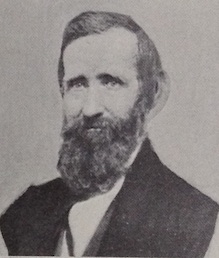
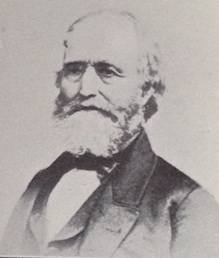
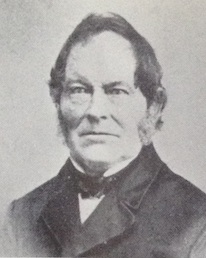
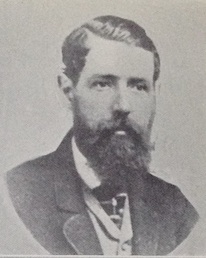
Timothy Davis, Ephraim Allen, Isaac Parker, Marcus Moore
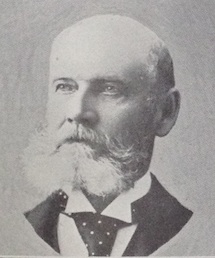
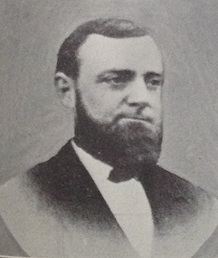
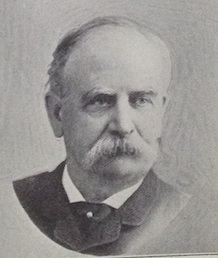
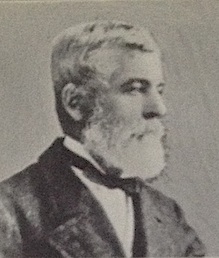
Henry Mulliken, Charles Houghton, Samuel Upham, Charles A. Welch
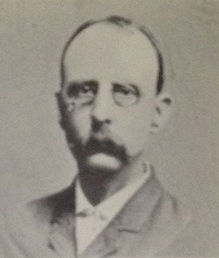
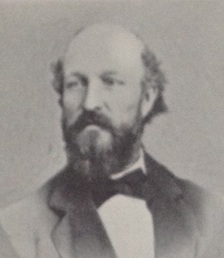
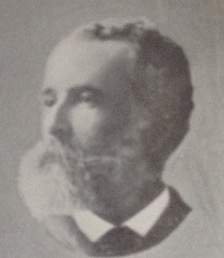
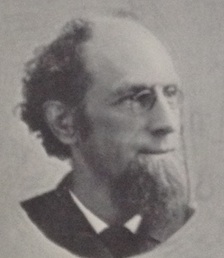
Louis Felix, Albert Bacon, Henry Hartwell, Luman Hall
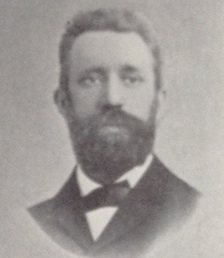
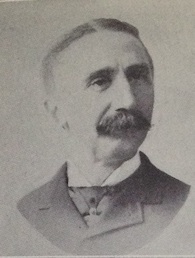
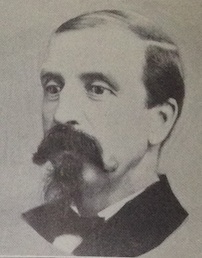
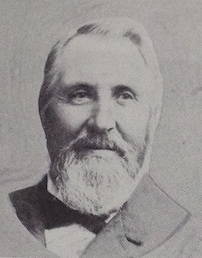
William Shakespeare, Nathan Warren, Rufus G. Brown, William H. Anderson
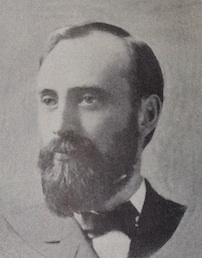
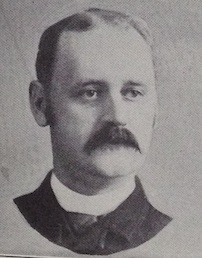
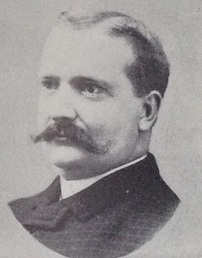
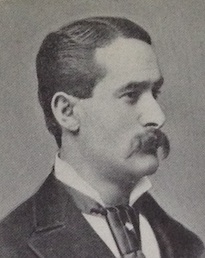
William Parmenter, James W. Follet, Frank K. Porter, Alonzo S. Locke
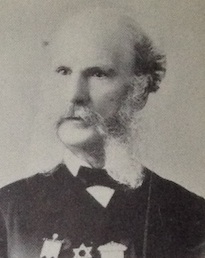
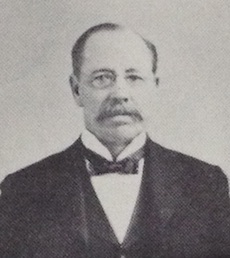
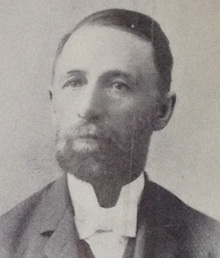
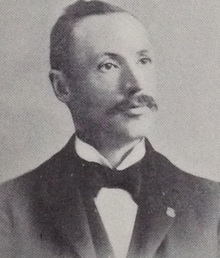
Jason N. Greenwood, Clarence Tebbets, Arthur P. Smith, Fred P. Rutter
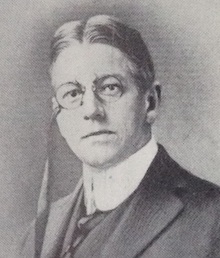
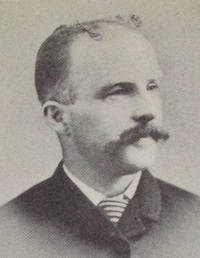
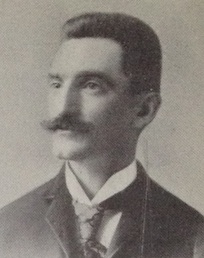
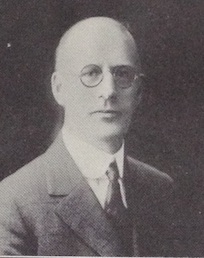
Melvin M. Johnson, Frank O. Locke, Robert B. Johnson, Charles N. Brodrick
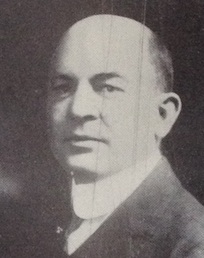
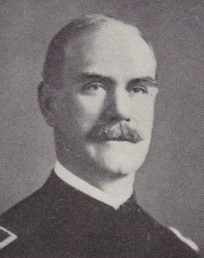
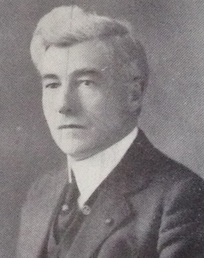
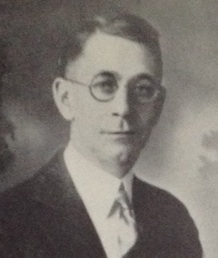
Arthur H. Paul, Charles J. Shephard, Louis A. Phillips, Fred C. Tebbets
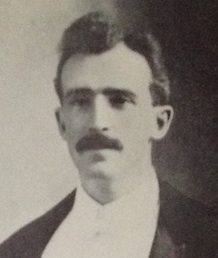
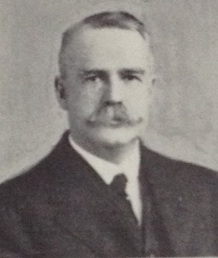
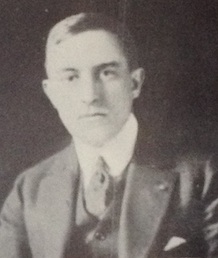
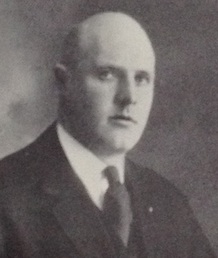
Fredrick W. Sawyer, Charles F. Bliss, John M. Gibbs, Howard S. Hatch
REFERENCES IN GRAND LODGE PROCEEDINGS
- Petition for Charter (as United Brethren, to meet in Waltham or Watertown): 1818; petitioners given leave to withdraw, 1819
- Petition for Charter: 1820
- Petition for Restoration: 1846
- Consolidation Petition (with Isaac Parker and Waltham Lodges): 1987
ANNIVERSARIES
- 1920 (Centenary; Special Communication; also listed in 1921 Grand Master's agenda)
- 1945 (125th Anniversary; Special Communication)
- 1970 (150th Anniversary; Special Communication)
VISITS BY GRAND MASTER
- 1821 (Dixwell; Constitution of Lodge and installation; Special Communication)
- 1847 (Robinson; installation)
- 1865 (Parkman; Hall dedication; see description below)
- 1879 (Welch; 2 visits, including hall dedication)
- 1880 (Welch; installation)
- 1902 (Gallagher; life member presentations)
- 1903 (Sanford; 1000th meeting)
- 1908 (Blake)
- 1910 (Flanders; installation)
- 1914 (M. Johnson; reception; see below)
- 1916 (M. Johnson)
- 1920 (Prince; Centenary; Special Communication)
- 1922 (Prince; Dedication of Masonic apartments; Special Communication)
- 1923 (Ferrell)
- 1927 (Simpson; Veterans' Night)
- 1937 (Allen)
- 1945 (Wragg; 125th Anniversary; Special Communication)
- 1946 (Wragg; reception for Junior Grand Warden Harry A. Starr)
- 1947 (Wragg; H. Alton Roark Night)
- 1953 (Roy; 50th Anniversary of M.W. M. Johnson as Master; Special Communication)
- 1970 (Jaynes; 150th Anniversary; Special Communication)
- 1977 (Maxwell)
- 1978 (Melanson; reception for Senior Grand Warden Brenton E. Tyler, Jr.)
- 1988 (Ames; consolidation of lodges; Special Communication)
BY-LAW CHANGES
1858 1871 1880 1885 1887 1894 1895 1899 1901 1912 1918 1921 1935 1943 1944 1946 1953 1960 1972 1974 1987
HISTORY
- 1920 (Centenary History, 1920-586; not in the Proceedings; a separate volume)
- 1945 (125th Anniversary History, 1945-384)
- 1970 ("Monitor Lodge, Its Contribution to the Masonic Fraternity"; 1970-483)
125TH ANNIVERSARY HISTORY, NOVEMBER 1945
From Proceedings, Page 1945-384:
By Right Worshipful H. Alton Roark.
In writing a brief history of Monitor Lodge for this important milestone, it is impossible to do more than touch lightly upon a few of the more interesting events in the life of this Ancient and Honorable Institution, which has held nearly two thousand recorded communications, any one of which could furnish items worthy of mention.
We learn from the records that Monitor Lodge was first prepared to be made a Masonic Lodge in the hearts of twenty-one worthy Brothers, who after several preliminary meetings, signed and presented to the Grand Lodge a petition dated December 13, 1820, asking for permission to form and open a Masonic Lodge in the Town of Waltham, to be known as Monitor Lodge. This petition was indorsed by Hiram Lodge, then located in Lexington, and Amicable Lodge of Cambridge. It was received by the Most Worshipful Grand Lodge on December 13, 1820, and referred to the Committee on Charters. The Committee reported at the same communication, recommending that the petition be granted and the Grand Lodge immediately approved the report, the Charter to date from December 13th.
Having received the sanction of the Most Worshipful Grand Lodge, the petitioners assembled on December 16, 1820, in a room where their preliminary meetings had been held, on the second floor of a wooden building located on the easterly corner of Main and Elm Streets, ten years later this building was removed to the westerly corner of Main and Church Streets, where it now stands, being occupied by Ball's Stationery Store. The second story room, which may well be called the Birthplace of Monitor Lodge, is occupied as an insurance office by Brother Charles Bowers, a member of Monitor Lodge.
Brother Reuben Allen acted as Chairman. Brothers Joshua Swan, Isaac Bemis and Asahel Adams were chosen a committee to draft a code of By-Laws for the new Lodge. The Brethren then adjourned to meet again on the "first Monday preceding the full of the moon in January," to hear the report of this committee and to make choice of officers for the ensuing year.
The first regular communication of Monitor Lodge was held on January 15, 1821, when the Brethren voted the adoption of the code of By-Laws as reported by the committee, and unani¬mously elected their first board of officers, as follows: Joshua Swan, Worshipful, or as then known, Rt. Wor. Master; Robert Smith, Wor. Senior Warden; Albigence W. Fisher, Wor. Junior Warden; Asahel Adams, Treasurer; Isaac E. Markham, Secre¬tary; Isaac Bemis, Senior Deacon; Daniel Emerson, Junior Deacon; Luther Richardson, Senior Steward; Andrew Poor, Junior Steward; and Reuben Allen, Marshal. Three petitions for the degrees were received—the first from Thomas Borden, the others from Nathan Oliver and William D. Mason.
The second communication was held on February 12, 1821, in the Masonic Hall. This was in a building situated on the corner of Main and Newton Streets. There is no record of any vote or discussion regarding leasing this Hall, the record simply states that the communication was held there. At this communication the three candidates were elected and initiated, and as Thomas Borden's petition for the degrees was the first to be presented, so was his initiation the first in the new Lodge.
At the special communication of Monitor Lodge held for the purpose of installing its officers and celebrating the nativity of St. John the Baptist, held at Masonic Hall on Monday, June 25, 1821, the Lodge was visited by the Most Worshipful Grand Lodge of Massachusetts, headed by Most Worshipful John Dixwell, Grand Master, who joined in the celebration and installed the officers of Monitor Lodge.
From January, 1821, to October, 1827, a period of six years, Monitor Lodge initiated seventy candidates, and of this number, less than forty became members of the Lodge. At that time candidates were balloted on before taking each degree, as well as for membership.
From October 29, 1827, to November 22, 1831, no petition for degrees or affiliation was received. This was the beginning of the period known as the Morgan excitement. The Lodge attendance decreased to less than ten. Then followed the most depressing period Masonry has ever known in this country. No record of Monitor Lodge appears between the dates of November 22, 1831, and December 28, 1846. For many years it was supposed that the Lodge had surrendered its Charter, despite a persistent tradition that some one of the Brethren, presumably Isaac Parker, had kept it free from harm. The following petition proved the tradition to be well founded.
To the Most Wor. Grand Master, at the Grand Lodge of Ancient Free and Accepted Masons of the State of Mass.
We the undersigned being Master Masons of good standing, and members of Monitor Lodge, Waltham, at the time said Lodge discontinued its meetings, respectfully represent: that we have the Charter, Furniture, etc. of said Lodge in safe keeping, that we believe the time has arrived when our meetings may be held with advantage to the Craft and for the good of Masonry generally. Therefore we respectfully pray for a revival of our Charter to enable us to hold our meetings and conform to the Laws and Regulations of the Most Worshipful Grand Lodge of the Commonwealth.
Dec. 16, 1846
Willard Adams Horace Heard
Abijah Whitney Abet Heard
Leonard Smith Luther Harrington
Harvey Chapin Isaac Parker
By unanimous vote of the Grand Lodge December 28, 1846, the prayer of the petitioners was granted.
The next communication of Monitor Lodge was held January 18, 1847, with Worshipful Lowell Adams, P.M. presiding, and Brother Willard Adams acting as Secretary. The following named Brethren were elected as the new board of officers:
- ISAAC PARKER, Worshipful Master
- LOWELL ADAMS, Senior Warden
- ABEL HEARD, Junior Warden
- DANIEL EMERSON, Treasurer
- WILLARD ADAMS, Secretary
- HARVEY CHAPIN, Senior Deacon
- HORACE HEARD, Junior Deacon
The meeting then adjourned to meet again at Odd Fellows Hall, then situated on the third story of the Stearns and Crehore Block, which was directly across Main Street from our present location, when the officers-elect were installed into office by the Most Worshipful Grand Master and Suite.
Since the meetings were discontinued in 1831, several modifications of the Ancient Customs had taken place. The titles of the first three officers of the Lodge were changed from Right Worshipful Master to Worshipful Master, Worshipful Senior Warden to Senior Warden and Worshipful Junior Warden to Junior Warden. Lodges had opened and conducted all business on any degree, usually on the first, and this was now changed to all business on the third degree. No interval necessary between degrees was changed to four weeks. Grand Lecturers were now appointed to conduct exemplifications. Such then, were the new conditions that confronted our Brethren of Monitor Lodge when they resumed their labors in January, 1847.
For some years interest in the Lodge seemed to be at a low ebb. During the period from 1847 to 1850, it was a hard struggle for our Brethren, and more than once they were inclined to give up the seemingly unequal contest. There were at times long intervals between the meetings and the attendance was very meagre. At the communication of October 17, 1850, thoroughly discouraged at their lack of success and by the seemingly hopeless outlook, the Brethren voted to surrender the Charter. Right Worshipful Jonathan Greenwood, then District Deputy Grand Master, met with the Brethren, and by his advice, they were persuaded to continue, and at the communication of December 19, the vote was rescinded.
At this communication, in response to renewed interest, four petitions were received. The tide seemed to have turned, and soon the prosperity they had looked for so anxiously began to greet and cheer them — the sun of better days began to shine. Seven applications were received in 1855, while in 1856 eighteen more made application. On October 20, 1857, Monitor Lodge membership was thirty-six.
In 1858, at the close of eleven years of faithful service as Worshipful Master of Monitor Lodge, Worshipful Brother Isaac Parker was presented with a Past Master's Jewel, the first presentation of its kind mentioned in our records. He was one of the last to give up the ship in 1832. There is strong evidence that while Freemasonry in Waltham was in a dormant state, he associated himself with Meridian Lodge, then located in Newton Lower Falls, for at the annual communication of the Grand Lodge December 28, 1846, his name was recorded as Senior Warden of that Lodge. This service in Meridian Lodge as Senior Warden, qualified him to meet the requirements of the Grand Lodge for election as Worshipful Master of Monitor Lodge.
In 1861 the District Deputy Grand Master, Right Worshipful William D. Coolidge, when making his annual report, said: "The suburban Lodges, Monitor of Waltham, Bethesda of Brighton and Pequossette of Watertown, though not doing a great amount of work, it is of the best materials and of finished workmanship."
February 22, 1864, Brother William B. Bothamly and thirteen other Master Masons petitioned for permission to organize a Lodge in Belmont. Monitor Lodge unanimously voted its consent.
In 1865 the members of the Lodge feeling the need of better and more commodious quarters, secured the second story of the Eagle Block and fitted it up for a Lodge room, with appropriate accessory rooms. On April 10, 1865, the Lodge occupied its new quarters for the first time. On this day word was received that the Civil War had ended, with victory for General Grant, so the Lodge closed its communication with singing America.
At the communication of April 15, 1867, a petition was received from Brothers Ambrose Webster, Charles Moore and Henry N. Fisher and others, asking for permission to form what was afterwards named Isaac Parker Lodge. There was some feeling against the organization of another Lodge in the Town, but that feeling was not carried so far as to vote in opposition
to the request. Worshipful Brother Webster was authority for the story that but one Brother voted on either side of the question — that one Brother being Brother Henry P. Sherman, who voted in the affirmative. A unanimous vote of those voting. Early in 1878 the Fraternity found itself outgrowing its quarters in the Eagle Block, and on March 8th, the Lodge voted to appoint a committee of three for the purpose of obtaining suitable accommodations. The Grand Master, Most Worshipful Charles A. Welch, Past Master of Monitor Lodge, made a proposition to the committee to erect a building at his own expense, at the corner of Moody and Charles Streets, designed for Masonic purposes. On recommendations of the committee, the Lodge voted to accept this generous offer.
On December 27, 1879, Charles A. Welch Hall and apartments were formally dedicated by the Most Worshipful Grand Lodge, followed by the installation of Lodge officers, headed by Nathan Warren, Worshipful Master; Rufus G. Brown, Senior Warden; and William H. Anderson, Junior Warden.
From this date forward, Masonry in Waltham became a living reality. The growth and development of Monitor Lodge, Isaac Parker Lodge and Waltham Royal Arch Chapter, under wise administrations, far exceeded the fondest hopes and dreams of our Brethren in the earlier days of Masonry in our community. This growth and development of our Masonic bodies like the growth of a family, naturally created a housing problem, which was met by naming a committee to cooperate with like committees from the other bodies. On June 20, 1920, Monitor Lodge voted unanimously to co-operate with Isaac Parker Lodge and Waltham Royal Arch Chapter, in purchasing the Maynard Block. The Waltham Masonic Building Association was organized with representatives from each of the Masonic bodies on the board for the purpose of financing the purchase, furnishing and operating the Masonic building.
The one hundredth anniversary of Monitor Lodge was observed by a three day celebration in commemoration of this important event in the life of our Lodge — opening on Sunday afternoon, December 12, 1920, at two o'clock for the purpose of attending Divine services at Asbury Temple, held for this special occasion. Attended by about five hundred members of Monitor and Isaac Parker Lodges, services opened with prayer, offered by Reverend Brother Edward F. Miller, Chaplain of Monitor Lodge. Special music for the occasion was furnished by the Pilgrim Male Quartet. The sermon of the day was delivered by Right Worshipful Rev. Frederick W. Hamilton, who chose for his theme, "What Does All This Mean?" It was a very inspiring sermon, ending with the expressed hope that another hundred years would see Monitor Lodge in the condition of today and improving with the years.
On Monday evening, December 13th, a regular communication of Monitor Lodge was held in Charles A. Welch Hall, with Worshipful John M. Gibbs presiding. After receiving a report from the Grand Marshal, Right Worshipful Frank W. Dobson, that the Most Worshipful Grand Lodge was ready to be received, the Worshipful Master appointed a committee of the Past Masters, Honorary and Life Members of Monitor Lodge, to escort into the Lodge Most Worshipful Arthur D. Prince, Grand Master of Masons in Massachusetts, who was most cordially welcomed by the Worshipful Master. The Most Worshipful Grand Master, in his well known pleasing manner, responded to this welcome and introduced to the Worshipful Master' the members of the Grand Lodge accompanying him. The Grand Master then assumed the East and was greeted by a song of welcome by the Pilgrim Quartet.
Worshipful Brother Gibbs then presented our own Most Worshipful Melvin M. Johnson, who delivered an impressive, formal address of welcome to his successor as Grand Master. The next business of the evening was the installation of officers. This ceremony was performed in a most excellent manner by the Grand Lecturer, Worshipful Frederic L. Putnam, who was a particular friend of Brother Howard S. Hatch, who was installed Worshipful Master.
Then followed an eloquent and interesting address by the Most Worshipful Grand Master that held the close attention of every one present until the last word was spoken. The Grand Lodge then retired and the Lodge was closed at 10:15, with 450 members of the Fraternity in attendance.
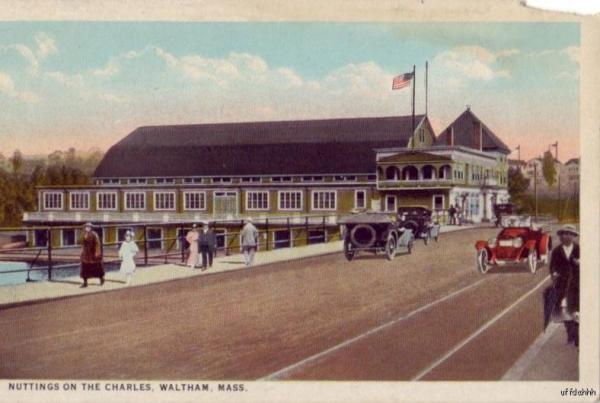
Nuttings on the Charles
The celebration closed on Tuesday evening when 760 members and guests assembled at Nuttings on the Charles to partake of a fine banquet and enjoy a very pleasant evening, with entertainment, music and dancing.
The next event of special importance was moving into our own new Temple. The last communication held in Charles A. Welch Hall was on June 27, 1921, called for the purpose of attending the funeral of our late Brother Roy Cobb Aiken. The first meeting held in our new quarters was on September 12, 1921, both of these meetings being presided over by Worshipful Master Howard S. Hatch. The Third Degree was worked that evening, there were 215 members present, 137 visitors, with a total attendance of 352.
On December 12, 1921, the first installation of officers of Monitor Lodge to be held in the new Temple was performed by Most Worshipful Melvin M. Johnson in his usual par excellent manner, before an audience of seven hundred members and guests. And thus came to pass the most cherished hopes of the Master-elect, H. Alton Roark, to serve as Master of Monitor Lodge in our own Temple, with its fine equipment and appointments, where the traditionally fine work of Monitor Lodge could be perpetuated.
On Wednesday evening, January 18, 1922, a special joint communication of Monitor and Isaac Parker Lodges was called, for the purpose of dedicating our new Temple. At 6.30 a dinner was served in the banquet hall. At 8:00 o'clock Worshipful John W. Ekwall, Master of Isaac Parker Lodge, and his officers opened the communication in Form. Worshipful H. Alton Roark then declared Monitor Lodge opened. Adoniram Council and Waltham Royal Arch Chapter were invited to participate in the dedication. Most Worshipful Melvin M. Johnson was appointed Chairman of a Committee consisting of all Past Masters and Life Members of Monitor and Isaac Parker Lodges to escort into the lodge-room Most Worshipful Arthur D. Prince, Grand Master, and his Suite, all of whom assumed their several stations and proceeded with the impressive ceremonies of dedication. After completion of the ceremonies, the Grand Lodge retired under escort of the same committee.
At the regular communication of May 14, 1928, a petition was received from about eighty Master Masons asking for permission to form and open a new Masonic Lodge in the City of Waltham, the fees for dues and degrees to conform to those of Monitor and Isaac Parker Lodges. At the regular meeting of June 11, 1928, with 166 members present, Worshipful Frank O. Locke, an Honorary Member, stated that Monitor Lodge was always broad-minded and had ever held an honorable record. He then moved that this petition for a new Lodge be granted. After some discussion, it was unanimously voted to grant this request. This was the third time Monitor Lodge had so voted, thus becoming the sponsoring Lodge for Belmont, Isaac Parker and Waltham Lodges. On September 10th, at a regular communication, it was voted to purchase a set of officers' collars with jewels and present them to the new Waltham Lodge with the best wishes of Monitor Lodge.
In civic affairs Monitor Lodge members have always accepted their share of responsibilities. While in the industrial, commercial and professional field, our members have taken a very active part. In the military activities of our country, Monitor members have responded to every call when danger threatened. In World War I we find on our Honor Roll the names of 82 members. In World War II we find 44 on our Honor Roll, many of whom are still in the Armed Services, doing their part in bringing a lasting peace and prosperity to our country.
The Grand Lodge has been most generous to Monitor Lodge in bestowing its honors. Two of our Past Masters have been elected to the high position of Grand Master - Most Worshipful Charles Alfred Welch and Most Worshipful Melvin Maynard Johnson, both of whom brought honor and credit to Monitor Lodge by their distinguished service to the Craft. One has been elected Senior Grand Warden, Most Worshipful Melvin M. Johnson; one Junior Grand Warden, Right Worshipful Henry Mulliken; five have been appointed to be District Deputy Grand Masters, Brothers Charles A. Welch, Frank K. Porter, Melvin M. Johnson, H. Alton Roark and Harry A. Starr.
Monitor Lodge membership at present writing is 554.
I am indebted to the research and writings of Brother Alexander Starbuck for valuable information and would like to ex¬press my appreciation of the beautiful records of that fine Secretary, beloved by every member of Monitor Lodge, Worshipful Frank O. Locke.
Finally, may we of today and those of tomorrow ever hold in sacred veneration those Masonic pioneers in our community who, though faced with hardships, disappointments and sacrifices, have kept the light of Masonry burning brightly on our Holy Altar.
150TH ANNIVERSARY HISTORY, NOVEMBER 1970
From Proceedings, Page 1970-483:
Monitor Lodge, Its Contribution to The Masonic Fraternity
By Worshipful Clyde F. Joslyn, Jr.
In celebrating its 150th anniversary, Monitor Lodge, A. F. & A. M. has become one of the oldest institutions in the Waltham community. Only two of the many churches can claim a longer life. The First Parish, Universalist-Unitarian, is the successor of the First Parish established in 1696 when Waltham was part of Watertown, and which removed into Waltham in 1722. In 1820 it being recognized that the ministry of this church had become Unitarian, those members not in sympathy with this movement left to form their own church, the Trinitarian Congregational, which as the First Congregational Church has earlier in 1970 celebrated its 150th anniversary.
The other churches came later although in many cases denominational preaching had been held in the community earlier. The Universalist Church was formed in 1836. In 1837 the Methodists bought the building formerly used by the 2nd Religious Society (Unitarian) situated on the Common. Christ Church, Episcopal, had its beginning in 1849 and St. Mary's Catholic Church and the First Baptist Church date from 1852. Odd Fellowship started in 1844 with Prospect Lodge. Waltham had its first newspaper in 1833, its first bank in 1836, and its first train in 1843. Although many famous industries have been located in Waltham, none have had a longer life than this Lodge.
Waltham itself has naturally changed greatly since 1820. When Monitor Lodge was formed, this community had a population of 1677 persons. The only bridge across the Charles River was at Newton Street. Moody Street bridge was not built until 1846. The South Side of Waltham was then part of Newton and was purchased by Waltham in 1849 for the sum of one thousand dollars. A foot bridge was built at Prospect Street in 1881.
The history of Monitor Lodge has already been well presented. At the Centennial anniversary in 1920 a complete and well bound history was prepared by Brother Alexander Starbuck which leaves little unsaid for the first century. Although this history does not appear in Grand Lodge Proceedings, copies are available at Grand Lodge as well as at Monitor Lodge. For the 125th anniversary in 1945, our Right Worshipful Brother H. Alton Roark admirably summarized Brother Starbuck's earlier work and added such additional information as seemed important. This history is included in the Grand Lodge Proceedings of 1945. (1945 Mass. 384-393)
We shall, in place of that, turn to look at the history of three Monitor members whose Masonic life span covers nearly our entire one hundred and fifty years and who have made an impression both on Waltham Masonry and on the Masonic Fraternity in general for which we can be both proud and grateful.
ISAAC PARKER 1802-1875
Worshipful Isaac Parker, our first subject, was born on July 19, 1802 in Watertown in a house which stood opposite where the Baptist Church now stands on Mt. Auburn Street. The family moved to Weston soon after his birth and he moved to Waltham in 1821. He lived on Willow Street in a house still standing near River Street, which he built himself. He was a farmer and his hayfield is now Raytheon property.
Isaac Parker applied for the degrees in Monitor Lodge soon after the Lodge started work. He was initiated, passed and raised during 1825 and was elected to membership on November 21, 1825, standing number 74 in a membership of over 1997 to the present day. He was early elected to office and we find that he was a Warden in 1830 and 1831.
In 1831, only eleven years after its beginnings, Monitor Lodge ceased to work as a result of the anti-Masonic feeling that swept the country at that time. Isaac Parker, however, refused to cease his own participation in the Craft. He became a member of Meridian Lodge, then at Newton Lower Falls, now located at Natick, and we find that he was their Senior Warden in 1846. He was one of the thirteen Waltham signers of the Declaration of Principles which gave notice to Boston and vicinity that Masonry was not worthy of such condemnation as it was experiencing.
The Declaration of Principles said in part "that deeply impressed with the conviction that the Masonic institution has been and may continue to be productive of their fellow citizens and should the people of this country become so mistaken as to deprive Masons of their civil rights in violation of its written constitution and the wholesome spirit of just laws and free governments, a vast majority of the fraternity will still remain firm, confiding in God and the rectitude of their intentions for consolation under the trials to which they may be exposed".
Isaac Parker's standing in the community was not greatly harmed by his Masonic participation. In 1838 and 1839 he lectured at the Rumford Institute, an organization of which he was a founder and of which he was for some years president and director. His lecture topics included at various times "Horticulture", "Meterology", and "Wages". However, to illustrate the attitude of some of his neighbors, we learn that one of them, to whom he had for some time delivered milk, refused to patronize him any longer saying he did not want "any more old Masons' milk".
On December 28, 1846, after a recess of fifteen years, eight members of the Lodge including Isaac Parker, petitioned Grand Lodge for a revival of their charter, which tradition says had been hidden by Isaac Parker. The petition was granted and Grand Master Simon W. Robinson installed the new officers of the Lodge, headed by Isaac Parker, on January 28, 1847. Isaac Parker was to remain Master for eleven years, until 1858, during which time one hundred and sixty meetings were held.
The records of this period are models of brevity so that little actual information can be found in them. A random example is given below to show the paucity of information.
"At a regular Communication of Monitor Lodge held at Mason's Hall on Thursday, May 15, 1851. Present: W. Master, Senior and Junior Wardens, Treasurer, Secretary, Senior and Junior Deacons, Tyler, Brothers Rufus Nichols, Joseph Price and Josiah Rutter. Fellowcraft Lodge opened in due form. Fellowcraft Lodge closed and that of Master Mason opened in due form. Master Mason Lodge closed and that of Fellowcraft opened, waiving all ceremony. Received an invitation from Essex Lodge of Salem to attend the Festival at Salem on June 24th, post and file. The lodge then closed and adjourned for two weeks from this day, then to meet at this place at 7 1/2 o'clock p.m. Attest, W. Adams, Secretary."
However, we do learn that during Isaac Parker's years in the East the then Masonic Hall in the Bemis Block was dedicated by Most Worshipful Winslow Lewis on October 13, 1856. Most Worshipful John T. Heard visited the Lodge on September 29, 1857 and at that time he gave a lecture on the duties of the officers, members and all Masons for the good of Masons generally. Of interest also is the raising of Brother (and General) Nathaniel P. Banks in Monitor Lodge on March 29, 1858 with the Deputy Grand Master present.
Isaac Parker received the first Past Master's jewel to be presented by this Lodge. This jewel has now come home to Isaac Parker Lodge after being in the possession of three generations of Parkers over a period of almost one hundred years. It was worn over a period of twenty-five years by Isaac Parker, Jr., son of Isaac Parker, at every meeting he attended of the Grand Lodge of the State of Washington, of which he was Junior Grand Warden in 1882-1883. The jewel has crossed the continent at least four times. It escaped the great Seattle fire of 1889 when the business part of the City was entirely destroyed as well as two burglaries of the home of Isaac Parker, Jr.
Isaac Parker's standing in the Craft is illustrated by the fact that on the formation of a second Lodge in this community, the members chose to honor him by adopting his name for the Lodge. Isaac Parker Lodge, A. F. & A. M. had its beginnings in 1867 during his lifetime. He was present at the constitution of the Lodge. Being called upon for remarks, he said, among other things, that they had taken his name without consultation and without permission and he hoped they would so conduct the affairs of the Lodge as to throw no stain on the name. The new Lodge adopted as its motto IN HOC NOMINUM HONORAMUS FIDELITATUS which translates as UNDER THIS NAME WE HONOR FIDELITY.
At the age of seventy-three, on October 4, 1875, Isaac Parker passed to the Celestial Lodge and well attended funeral ceremonies were held at the First Parish Church, where he had been a deacon for the past thirty-five years. The Newton Band escorted the Masons of the Town to Grove Hill Cemetery where Masonic services were held with the assistance of the choir of the First Parish Church. The Special Communication of Monitor Lodge held for the purpose of rendering Masonic funeral honors to him was but the second such Communication as far as the writer can determine, the first such occasion having been two years earlier in 1873.
Isaac Parker was survived by his widow and three sons and two daughters. Five other children had predeceased him. Among those at the funeral was our second subject, the then Deputy Grand Master, Right Worshipful Charles Alfred Welch.
CHARLES ALFRED WELCH 1815-1908
Charles Alfred Welch was born at Boston on January 30, 1815. He graduated from Harvard College in 1833. His career at Harvard College had been interrupted for a time due to various offences, both academic and otherwise. He came to Waltham to study at the famous Ripley School conducted by the Reverend and Mrs. Ripley. He was readmitted to his Harvard Class and on graduation was admitted to Phi Beta Kappa, although he acknowledged that some of his classmates did not think him worthy of the honor. He taught Greek and Latin for two years at Baltimore College and on his return to Boston studied law and passed the Bar in 1837. He then formed a law partnership with Edward D. Sohier. This firm was connected with the famous Webster-Parkman murder case of 1849. Professor John Webster of Harvard College and Harvard Medical School was, in 1849, charged with the murder of Dr. George Parkman, a member of a prominent Boston family, over money matters. Webster was convicted and executed in 1850. The justice of his sentence is still debated to this day with a current book in preparation demonstrating his innocence.
Charles A. Welch moved to Waltham in 1846 and resided on Linden Street. He took his degrees in Monitor Lodge in 1861 and was elected to membership on September 16, 1861. He is 179 on the membership rolls. His term as Master of the Lodge was during 1868-1869, just a year over the century mark today. During this period Monitor Lodge met in the Bemis Block (now Eagle) in the Lodge room dedicated during Isaac Parker's term as Master.
Thirty-one meetings were held during Charles Welch's term in the East. The records are almost as brief as those of earlier years. We do find that on April 6, 1868, a formal discharge was given to twelve members who had the year before formed Isaac Parker Lodge. Also on May 30, 1868 a Special Communication was held for the purpose of attending the dedication of the Soldiers' Monument on the Common. Charles A. Welch was absent from this event, the Junior Warden presiding.
Charles A. Welch was District Deputy Grand Master of the 4th Masonic District in 1872-1873 and went on to higher office in 1874 as Deputy Grand Master and Grand Master for the years 1877-1879. (Note: these are dates of his election; he served 1878-1880. - Ed.)
When the Lodge quarters in Waltham became too small for the continued use of the two Lodges and Waltham Royal Arch Chapter, Charles A. Welch built the structure that bore his name on Moody Street and which housed the Masonic apartments for the years prior to the move to this Temple in 1920.
The building was erected in 1878-1879 and was dedicated by Most Worshipful Charles A. Welch, Grand Master on December 27, 1879, following which he installed the officers of Monitor and Isaac Parker Lodges in a double ceremony. The architect for the building was Worshipful Brother Henry W. Hartwell, a Past Master of Monitor Lodge. The one other Special Communication of Grand Lodge to be held in what is now the 5th Masonic District during his term was on February 26, 1880 for the dedication of the Masonic Hall in Belmont.
Most Worshipful Charles A. Welch's years as Grand Master (1877-1879) were highlighted by his action to pay off the debt incurred in building the Grand Lodge Structure which had been dedicated in 1867 in the presence of Brother Andrew Johnson, President of the United States. A per capita head tax of ten dollars was levied on all Massachusetts Masons and to insure that Monitor Lodge was fully paid up, he advanced the sum of $1520.00 for Monitor's assessment.
The Grand Lodge building of this time was the first built on the corner of Boylston and Tremont Streets following the destruction of the former Temple by fire in 1864. M. W. Charles A. Welch's program was successful in paying off the debt, but he lived to see this building also burned on September 7, 1895. The fire burned from the fifth floor up, the lower floors received only water damage. However, a new and grander Temple arose on the same site which was dedicated in 1899 prior to M. W. Charles Welch's death.
At the Regular Communication of Monitor Lodge on September 29, 1879, the Grand Master, Brother Welch was present in his official capacity for a special purpose. After his introduction to the Lodge, the Grand Marshal conducted John Stark to the altar where he received the obligations of all three degrees. The Grand Master then declared that Brother Stark was formally healed. John Stark had previously received the degrees improperly in Scotland through no fault of his own.
Most Worshipful Brother Welch was a member of both the York and Scottish Rites and was a charter member of Waltham Royal Arch Chapter. He received the Honorary Thirty-third Degree in 1876.
Charles A. Welch Lodge, A. F. & A. M. of Maynard was chartered on March 1, 1873 while Brother Welch was District Deputy Grand Master of the 4th Masonic District. As was permissible at that time, persons could perpetuate their name by providing financial support for a new Lodge. The Welch family has made generous contributions to this Lodge. The portrait of Charles A. Welch in Corinthian Hall of the Grand Lodge was given by him in 1882 and was painted from life by Brother Edgar Parker. An almost duplicate portrait graces our apartments and we may assume it was executed by the same artist.
Brother Welch was a member of the Waltham School Committee during the years 1870-1875. He moved to Boston and Cohasset in 1880 and died at Cohasset on January 22, 1908. He was survived by two sons and is buried at Mt. Feake Cemetery, Waltham. As was customary in Monitor Lodge at this period, a memorial to him was prepared and spread on the records. The three members who prepared this record were: Alexander Starbuck, Frederick Rutter, and the third member of our study, the then Past District Deputy Grand Master, Right Worshipful Melvin Maynard Johnson.
MELVIN MAYNARD JOHNSON 1871-1957
Right Worshipful Melvin Maynard Johnson was born in Waltham on May 11, 1871. He attended Waltham schools and was graduated from Tufts College in 1892 and Boston University Law School in 1895. He was a member of a law firm in Boston for most of his life and during his years in Waltham resided at 46 Pond Street. He served as a professor at Boston University Law School from 1918 to 1935 and Dean from 1935 to 1943. His law firm was involved in the famous 1909 Waltham murder case of LeBlanc-Glover. As Senior Defense Counselor he won acquittal for Hattie LeBlanc from the charge of shooting Clarence D. Glover, her employer.
Melvin M. Johnson took his degrees in Monitor Lodge in 1892, standing 496 on the membership list and was elected Worshipful Master for 1902-1903. At his second installation as Master, Most Worshipful Sereno D. Nickerson, then Recording Grand Secretary, performed the ceremony and gave some reminiscences of his nearly fifty years connection with Grand Lodge. During his two years in the East, thirty-eight communications were held and he was present at all but one. This one absence was due to the death of his brother.
In March of 1902, he proposed holding a Life Members Night as up to that time no recognition had been given to Life Members. Accordingly on April 14, 1902 such a night was held with Most Worshipful Charles T. Gallagher, Grand Master, in attendance to present life medals. Thirty-five of fifty-two eligible members were there to be recognized. Music was furnished by Odell's Orchestral Quintette of Boston and members from twenty-five Lodges were represented at the meeting.
On Saturday, December 27, 1902, Monitor and Isaac Parker Lodges celebrated the Feast of St. John the Evangelist with 134 members present. The menu for the dinner makes our present day banquets hardly worthy of the name. The observance of the Feast was not a complete innovation as the records indicate that in the early days the Brethren met and marched to Brother Leonard Smith's Tavern and had a dinner in such an observance. Grand Lodge celebrated the Feast on December 30, 1902 so that there was no conflict of interest. On January 13, 1903, Melvin Johnson remarked that a new Bible had been donated by a member of Monitor Lodge who had taken a deep interest in the Lodge and did not need preservation on that account. The Bible presented in 1903 still rests upon our altar and we know now that the donor was Brother Melvin Johnson.
During 1903 the 1000th Communication of the Lodge approached and special recognition seemed called for. The actual 1000th Communication was for a funeral so that the 1001st Communication on April 13, 1903 became the scene of the celebration. Most Worshipful Baalis Sanford, Grand Master, and Honorable Brother Curtis Guild, Lieutenant Governor of the Commonwealth, were present. Alexander Starbuck gave a historical sketch during the evening. It may be of interest that it took the first 83 years to reach the 1000th Communication while we reached the 2000th in 48 years on April 9, 1951 while Worshipful Andrew B. Robertson was Master.
Also during Brother Melvin Johnson's term, the Lodge donated a picture suitably framed and inscribed for the decoration work at the Waltham High School, then being conducted by the Alumni Association.
Wor. Melvin M. Johnson was appointed District Deputy Grand Master of the 5th Masonic District in 1904 and 1905. He was elected Senior Grand Warden in 1909 and Grand Master in 1914 to 1916. During his term as Grand Master, we find only one Special Communication of Grand Lodge was held in the 5th District. On January 21, 1914 he dedicated the Watertown Masonic Temple.
At the Feast of St. John held on December 29, 1914, Brother William Howard Taft, former President of the United States, was the principal speaker. On May 11, 1916, a Special Communication of Grand Lodge was held for the purpose of dedicating a monument to the memory of Jeremy Gridley, Grand Master 1755-1767, at the Granary Burying Ground in Boston.
During Worshipful Victor C. Harnish's term as Master in 1953, M.mW. Melvin M. Johnson was honored on his golden anniversary as a Past Master, at which time a picture of him was taken in the East of this Temple. For many years he regularly installed the officers of Monitor Lodge, the last such event being on December 9, 1946 for the installation of Worshipful Augie W. Johnson.
M. W. Melvin M. Johnson was a member of the York and Scottish Rites and was Sovereign Grand Commander of the Supreme Council of the Northern Masonic Jurisdiction of the Scottish Rite from 1933 to 1954. He held many honorary degrees as well as Masonic honors from the Lodges of both this country and from Europe. He was an Honorary Member of Charles A. Welch Lodge in Maynard and a Charter Member of Waltham Lodge in Waltham.
M. W. Melvin M. Johnson was long recognized as an outstanding Masonic Historian both here and abroad. Among his writings were many articles as well as two well known books: Free Masonry in America Prior to 1750 (1916) and The Beginnings of Free Masonry in America (1924). M. W. Melvin M. Johnson died at Boston, December 18, 19S7 and was survived by his second wife and a son. A daughter predeceased him. His remains are buried in the family plot at Mt. Feake Cemetery, Waltham, where also rests his father, Waltham's first Mayor.
To quote briefly from the Memorial Service conducted by Most Worshipful and Reverend Thomas S. Roy on December 27, 1957 at Grand Lodge: "For over fifty years our Brother had been an officer of this Grand Lodge. During these years he came to a position of world prominence in Masonry beyond that of any other man of his generation".
This, then, is a portion of Monitor Lodge's contribution to the community and the Craft during its first 150 years. Although we give pride of place to these three brethren, we are mindful that the remaining roll of brethren have also made their contributions. Our civic life and our business world have felt their weight. Our memorials list their service to their country in many wars. Their Masonic honors grace our history and from the efforts of them all, Monitor Lodge has earned an enviable record of preeminence that augurs well for the future. We do not forget that Monitor Lodge is an organization of 1997 brothers who together, each in his part, have over these years justified its organization in 1820.
OTHER
- 1896 (Attendance at cornerstone laying in Newton; 1896-257)
- 1914 (Presentation at the Feast of St. John, 1914-444)
- 1929 (Attendance at constitution of Waltham Lodge; 1929-59)
EVENTS
INSTALLATION, JANUARY 1847
From Moore's Freemason's Monthly Magazine, Vol. VI, No. 6, March 1847, p. 183:
Bro. Moore – the M.W. Grand Lodge of this Commonwealth having granted a revival of Monitor Lodge, Waltham, the Brethren met on Monday evening, Jan. 18th, and elected their officers; and on Thursday evening, Jan. 28th, the following named Brethren were duly installed by the Grand Master, Simon W. Robinson, viz.:
- Isaac Parker, W. M.
- Lowell Adams, S. W.
- Abraham Whitney, J. W.
- Dr. T. Kitteridge, Treas.
- Willard Adams, Sec.
- Harvey Chapin, S. D.
- Horace Heard, J.D.
Regular meetings, Thursday evening preceding the full of the moon in each month.
INSTALLATION, JANUARY 1848
From Moore's Freemason's Monthly Magazine, Vol. VII, No. 6, March 1848, p. 160:
Bro. Moore :—The officers of Monitor Lodge of Masons, were installed in presence of the public this evening, at Rumford Hall. The installation ceremonies were performed by R. W. Bro. Greenwood, of Framingham, the Dist Dep. Grand Master for this district. After the installation, Br. Horace G. Barrus, of Chelsea, delivered an appropriate address, which was listened to for more than an hour by a crowded and attentive assemblage of ladies and gentlemen. The singing and music by the orchestra and members of the "Mozart Society," were performed in a manner that reflected great credit upon their musical abilities.
The officers for the ensuing year, are—
- Isaac Parker, W. Master
- Joseph O. Derby, S. W.
- Abraham Whitney, J. W.
- Theodore Kittredge, Treas.
- Willard Adams, Sec'ry
- Harvey Chapin, S. D.
- Samuel B. Whitney, J. D.
- Henry M. Ryan, Tyler.
HALL DEDICATION, OCTOBER 1856
From Moore's Freemason's Monthly Magazine, Vol. XVI, No. 1, October 1856, Page 12:
Monitor Lodge, located in the pleasant village of Waltham, having recently fitted up, at considerable expense, a neat and commodious Hall, having convenient outer-rooms, and all the necessary fixtures and furnishings required for the proper working of the degrees, presented it to the Grand Lodge for dedication, in accordance with ancient custom, to the purposes of Masonry. The M. W. Grand Master, not being able to attend in person, and his Deputy being absent, commissioned the R. W. Brother John T. Heard, Esq., Senior Grand Warden, to attend with the Grand Officers for the purpose of performing that interesting and time-honored ceremony, on the evening of the 6th October last. The Dedication was public, and the services took place in the presence of a large number of ladies, and other invited guests. That they were well performed, none need be assured, who are acquainted with the precise and skillful manner in which all his Masonic duties are performed by the accomplished Brother and excellent officer who presided on the occasion. At the close of the services, Brother Heard addressed the members of the Lodge in the following earnest and appropriate terms :—
Worshipful Master, Officers and Members of Monitor Lodge :—
It is much regretted that the ceremonies of this evening could not have been conducted by the Grand Lodge in ample form, as then we should have been cheered by the presence of our esteemed Most Worshipful Grand Master, and have received from his eloquent lips instruction befitting the occasion. Owing to his absence, this grand body have been compelled to assemble inform only, and under the direction of a subordinate officer.
We congratulate you, Monitor Lodge, that you have, by your liberality and good taste, provided this neat and appropriate Hall for the services of Freemasonry. It affords another assurance of your devotion to the welfare of our Older. For more than thirty years you have manifested the sincerest attachment to our principles; in good report and in evil report you have remained steadfast in the faith; you have evinced a steady firmness and courage in adversity; and have borne prosperity with a manliness and moderation meriting the highest commendation. From a career so honorable, we find all that we had reason to anticipate—a happy, prosperous and united Lodge. Having now solemnly dedicated this edifice to Masonry, Virtue and Universal Benevolence, we have performed a rite that should constantly remind you that this place is set apart and consecrated for the practice of our Art, and the inculcation and exemplification of the tenets of our profession. Masonic Halls are always dedicated, either in public or in private, and with more or less formality; and the brotherhood have ever felt that the ceremony was a salutary and 'needed prerequisite ere Masonry could be practised therein.
The earliest account, in our language, of a public dedication of a Masonic Hall, relates to Freemasons' Hall in London, England, erected and dedicated by the Grand Lodge of England — the parent of Freemasonry on this continent. The historian refers to the occasion in these words : "On the 23d of May, 1776, it (the hall) was opened and dedicated, in solemn form, !o Masonry, Virtue and Universal Charity and Benevolence, in the presence of a brilliant assembly of the Brethren. A new Ode, written and set to music for the occasion was performed before a number of ladies, who honored the Society with their company on that day. An Exordium on Masonry, not less elegant than instructive, was given by the Grand Secretary, and an excellent oration delivered by the Grand Chaplain. In commemoration of an event so pleasing to the Society, it was agreed that the anniversary of this ceremony should be ever after regularly kept." It will be observed that the ceremonies of dedication as here narrated, accord with those practised at tile present day. There were, doubtless, public dedications in other parts of England long anterior to that just mentioned ; for Masonic Halls existed in every part of the kingdom for the accommodation of subordinate Lodges. In this country Lodge-rooms have been and are frequently dedicated in public, and among the most noticeable of the occurrences of this kind was the dedication of the magnificent, gorgeous suite of apartments in the Masonic Temple at Philadelphia, which took place during the past year.
Our temples are dedicated to Masonry, Virtue and Universal Benevolence. This is the Ancient form. This triune dedication seems to be supererogatory, if we reflect that Masonry inculcates virtue and benevolence, and that, therefore, the dedication to Masonry alone, would give to the rite all the significance that appertains to the ancient custom. And here it is appropriate to inquire "what is Masonry?" A modern writer has elegantly and truthfully defined it to be " a beautiful system of Morality, veiled in allegory, and illustrated by symbols. Truth is its centre — the point whence its radii diverge — pointing out to its disciples a correct knowledge of the Great Architect of the Universe, and the moral laws which He has ordained for their government." Many are the truths conveyed to the minds of Masons by the aid of expressive symbols, by striking allegories, and also, by appropriate emblems. I need not to remind you that by symbols we typify the importance of caution in behaviour, punctuality in our duties and engagements, compassion for our suffering fellow-men, rectitude of life, faith in God, the judicious division and employment of time, and of the necessity of a perfect moral character; that our allegories teach us to look Heaven-ward for all blessings, to seek Divine light and guidance in all our undertakings, and to remember our own short-comings and infirmities; nor that, by emblems we are instructed to be industrious in our avocations, to be circumspect in all our actions, to lead a virtuous life, to cultivate knowledge and to bear in remembrance the shortness of life and our rapid approach to that "undiscovered country from whose bourn no traveller returns." The laws and precepts of Masonry leach us to reverence our Maker, to obey the laws of our country, and to do unto others as we would have them do unto us. Masonry fosters a spirit of brotherly-love towards all mankind, seeks to relieve the unfortunate and afflicted, and regards truth as the foundation of virtue; it enjoins temperance in the indulgence of our appetites, fortitude in the day of trial and adversity, prudence in the choice of our associates and our intercourse with the world, and justice in rendering to every man his just due, without distinction; it forbids political discussions in assemblies of Masons, while it cherishes respect for the civil magistrate, and honors patriotism; and, finally, avoiding the disputes of contending religious sects, and leaving every individual to follow the dictates of his own conscience in all other respects, Masonry requires a belief in one infinite, eternal Uod, the ruler oi the Universe and creator of all things. From this brief summary of the character, aim ami requirements of Freemasonry, it will readily be conceived that the business and services of our assemblies are of a serious and exalted nature; and that, therefore, the places where we meet are, to us, sacred places, to which are most appropriately adapted the solemn dedicatory ceremonies prescribed in our ritual.
In conclusion, Brethren of Monitor Lodge, permit us to enjoin it upon you never to allow this place you have so wisely contrived for your communications, so long as it shall be under your control, to be used for any other than the purposes to which it has been dedicated. Let it be to you your sanctum sanctorum whither you can resort and commune together in friendship, harmony and peace. Let it never be desecrated by unworthy contentions among you, nor by any violation of the duties you owe to one another and to our Order. Let no man be admitted here to the privileges of Masonry whose moral character is not above reproach, and who has not some employment or visible means of supporting himself and his family. Let drones and the dissolute be kept beyond your borders, and no one be admitted within them who cannot add to the common stock of knowledge and usefulness. A due attention to these admonitions and to the ancient landmarks of our Institution, will secure for you a continuance of the happiness and prosperity you now enjoy, and merit the benediction of every faithful Mason.
The address was followed by appropriate and eloquent extemporaneous remarks by the Rev. Mr. Alger, one of the Grand Chaplains of the Grand Lodge; when the services were concluded. After which the company repaired to an adjoining hall, where an excellent entertainment had been served up for their refreshment, and where an hour or more was spent in a very agreeable, and, as a Brother at our side remarked, "sensible" manner!
The Hall is not large, but it is neatly fitted up, and is sufficient for all the purposes of the Lodge. And we heartily congratulate our Brethren that they have been able, from their own funds, after the many discouragements to which they have been subjected, to provide for themselves accommodations so comfortable and convenient. They have our best wishes for their continued prosperity and happiness.
INSTALLATION, JANUARY 1858
From Moore's Freemason's Monthly Magazine, Vol. XVII, No. 4, January 1858, Page 128:
At a meeting of Monitor Lodge, Waltham, held at Masons' Hall on Monday evening, Jan. 18, 1858, the following named Brothers were installed as officers for the ensuing year:—
- Isaac Parker, W. M.
- R. S. Warren, S. W.
- M. Aurelius Moore, J. W.
- T. W Farnsworth, Sec.
- J. H. Bowker, Treas.
- H. Mulliken, S. D.
- H. M. Britton, J. D.
- Wm. Gibbs, S. S.
- C. H. Houghton, J. S.
- L. P. Frost, Chap.
- C. W. Fogg, M.
- E. S. Stanley, Tyler.
OFFICER LIST, DECEMBER 1858
From Moore's Freemason's Monthly Magazine, Vol. XVIII, No. 2, December 1858, Page 64:
Officers of Monitor Lodge, Waltham —
- M. A. Moore, M.D., W. Master.
- Henry Mulliken, S. W.
- H. M. Britton, J. W.
- J. H. Bowker, Tr.
- T. W. Farnsworth, Sec.
- J. G. Thayer, S. D.
- C. H. Houghton, J. D.
- Wm. Gibbs, S. S.
- Alonzo Bowers, J. S.
- C. W. Fogg, Marshal.
- M. P. Alexander, Organist.
OFFICER LIST, JANUARY 1860
From Moore's Freemason's Monthly Magazine, Vol. XIX, No. 3, January 1860, Page 96:
Officers of Monitor Lodge, Waltham, Mass., for 1860.—
- M. A. Moore, W. M.
- H. Mulliken, S. W.
- H. M. Britton, J. W.
- J. H. Bowker, Treas.
- T. W. Farnsworth, Sec.
- J. G. Thayer, S. D.
- C. H. Houghton, J. D.
- Wm. Gibbs, S. S.
- A. Bowers, J. S.
- C. W. Fogg, Marshal
- L. Bowers, Tyler.
HALL DEDICATION, MAY 1865
From Moore's Freemason's Monthly Magazine, Vol. XXIV, No. 8, June 1865, p. 229:
The Brethren of Monitor Lodge at Waltham, having recently fitted up for their accommodation a new and commodious Hall, the same was publicly Dedicated by the M. W. Grand Lodge on the evening of the 14th of May last. There was a large party present, consisting of Brethren and their ladies, to many of whom the ceremonies were doubtless new, and to all apparently interesting. They were conducted in the following order:
- Voluntary.
- Reception of the M. W. Grand Lodge.
- Address of W. Master, Brother Charles H. Houghton.
- Prayer.
- Hymn:
- Architect's Address.
- Presentation of Working Tools.
- Examination of Halls.
- Selections of Scripture.
- Ceremony of Dedication.
- Hymn.
- Address by the Grand Master.
- Closing Hymn.
- Benediction.
"The Groves were God's first Temples" made
That many might early learn to praise;
And bowing in the sylvan shade,
To Thee, O God, his homage raise.
But Light advanced! New Temples sprung
Beneath the Craftsman's skillful hand,
That grateful love might find a tongue
Where Wisdom, Strength and Beauty stand.
At the conclusion of the ceremonies a procession was formed and company repaired to the Banqueting Hall and partook of a very excellent supper.
The ceremonies in the Hall were agreeably interrupted by the presentation of a very beautiful and appropriate Banner by the Ladies. The presentation was made in their behalf by Brother Charles A. Welch, Esq., in a characteristic address - witty and pertinent. We had hoped to lay it before our readers, but have not been able to obtain a copy; probably for the reason that our Brother's well known modesty would not allow him to write it out! The reception address was made by the Master of the Lodge, and was a well conceived and appropriate response.
The new Hall is a very handsome and commodious one, having all the necessary conveniences of ante-room, &c. It is also of sufficient size, and is neatly furnished.
The Lodge was originally chartered in 1820, and is now in a very prosperous and healthy condition, having a membership of about one hundred. A Chapter has lately been established in connection with it, which we understand is doing a good business and promises well for the future. They both have the hearty good wishes of their Brethren and Companions for their continued prosperity.
INSTALLATION, JANUARY 1878
From Liberal Freemason, Vol. I, No. 11, February 1878, Page 348:
At the communication of January 19, Monitor Lodge installed the following officers: William Shakespeare, W. M.; Nathan Warren, S. W.; Rufus G. Brown, J. W.; Horatio Moore, Treasurer; Thomas Kirke, Secretary; J. F. Moore, S. D.; W. W. Carpenter. J. D.; E. T. Sykes, Chaplain; W. W. Locke, Marshal; Arthur P. Smith, S. S.; Forest Miller, I. S.; Epbraim Stearns. Chorister; — Bradshaw, J. S.; — Tolman, S.; Charles S. Parks, Tyler; Charity Committee, J. C. Bates, William Locke, and John G. Miller. Past Master Luman N. Hall was presented with an elegant jewel, the gift of members of the Lodge.
INSTALLATION, DECEMBER 1906
From New England Craftsman, Vol. II, No. 5, February 1907, Page 189:
At the Annual Meeting of Monitor Lodge, Waltham, Mass. the following officers were installed by Wor. Bro. Melvin M. Johnson, Grand Marshal of the Grand Lodge of Mass. assisted by Wor. Frank O. Locke as Marshal. Robert B. Johnson, Worshepful Master; Charles N. Brodrick, Senior Warden; Arthur H. Paul, Junior Warden; Luman N. Hall, Treasurer; Alonzo S. Locke, Secretary; Robert Murray, Chaplain; James N. Greenwood, Marshal; Charles J. Shepard, Senior Deacon; Louis A. Phillips, Junior Deacon Roger W. Upham, Senior Steward; Fred C. Tebbetts, Junior Steward; Frederick W. Sawyer, Inside Sentinel; Fred L. Caswell, Organist; Charles H. Parks, Tyler.
The tyler, Bro. Charles H. Parks, was installed in his office for the 39th time. Brother Charles H. Thayer and Brother Frank H. Studley have each completed 50 years' membership during the past year. In speaking of the annual meeting, Bro. Locke, the secretary, says: O"ur annual Communications have become veritable family gatherings, and many of our members who are unable to meet with us regularly, take this opportunity to meet to re. new old acquaintances, talk over the days of Auld Lang Syne and meet our brethren of more recent years.
INSTALLATION, DECEMBER 1907
From New England Craftsman, Vol. III, No. 4, January 1908, Page 141:
The officers of Monitor Lodge, Waltham, Mass.. were installed by Wor. Melvin M. Johnson, Grand Marshal of the Grand Lodge of Mass. Monday. December 9, assisted by Past Master Wor. William M. Farrington as Marshal.
The new officers are: Charles N. Brodick, W. M.; Arthur H. Paul, S. W.; Charles J. Shepard, J. W.; Luman N. Hall (P. M.) Treasurer; Frank O. Locke (P. M.), Secretary: Rev. Robert Murray, Chaplain; George M. Bates, Marshal; Louis A. Phillips, S. D.; Fred C. Tebbetts. J. D.; Frederick W. Sawyer, S. S.; Arthur I. Teele, J. S.: Fred L. Caswell, Organist; Charles H. Parks, Tyler.
The latter officer was installed for the 39th consecutive time, although he has held the station almost a year longer, having taken the position a month after the previous incumbent was elected. Past Master Alonzo S. Locke retires as Secretary after 11 years' attendance upon those duties, and the chaplain has been 14 years acting as such.
PRESENTATIONS, FEBRUARY 1908
From New England Craftsman, Vol. III, No. 7, April 1908, Page 258:
Written for the New England Craftsman by Brother Alonzo S. Locke.
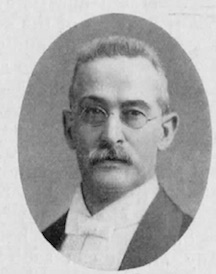

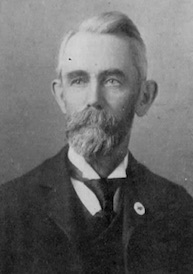
Locke, Davis, Starbuck
While every Communication of Monitor Lodge is interesting and profitable, the February Communication was of more than ordinary interest to the large number of members and visiting brethren who were present that evening. Two of our life members had been called to the Grand Lodge above: Rt. Wor. Charles Alfred Welch and Bro. William Roberts.
Rt. Wor. Bro. Welch received the Degrees in Monitor Lodge, and was admitted to membership September 16, 1861. He served as Junior and Senior Warden and was Worshipful Master from Nov. 1867 to Nov. 1869.
Bro. Alexander Starbuck presented a memorial, in which he recounted the Masonic life of our revered Rt. Wor. Brother and paid an eloquent and loving tribute to his memory.
Bro. William Roberts received the degrees in Monitor Lodge and was admitted to membership October 26, 1863.
Wor. Bro. Nathan Warren presented a memorial, in which he paid a tender and eloquent tribute to our brother, who although he had not held any office in the lodge, had always been a faithful and devoted member, courteous in his behavior, charitable in his dealings with his fellowmen, a tender husband, and an upright man.
One of the interesting events of the evening was the presentation to the lodge of the Past Master's Diploma, of Worshipful Timothy Davis, who served as Worshipful Master of Monitor bodge from Jan., 1827 to Jan. 1829. Brother Alexander Starbuck, historian of the lodge, in presenting the diploma, stated that he received a letter from Wor. Bro. Van Valkenburgh of Meridian Lodge, Natick, stating that the Diploma was found in the archives of Meridian Lodge, and that he should like to present it to Monitor Lodge.
Brother Starbuck endeavored to persuade Wor. Bro. Van Valkenburgh to present it in person, but he modestly declined the honor, and requested Bro. Starbuck to do it for him.
In his presentation he stated that Wor. Bro. Davis was elected Wor. Master Jan. 8, 1827, and two weeks later he was installed. The following year, Jan. 14, 1828, he was reelected and served throughout the year. The records make no mention of his being installed a second time, probably because in those days the ceremony does not seem to have been considered necessary, after it had once been performed.
Bro. Starbuck after alluding to the Anti-Masonic crisis, said,
"The attack on our Order was disastrous; those who loved Masonry for itself and for the beautiful lessons it inculcates, stood by the ship when the gale and the seas raged most fiercely - while those who were only Masons for curiosity, or for selfish motives, fell by the wayside and let their steadfast brethren bear the denunciation and contumely heaped upon them. It was in the fierceness of this storm that our Wor. Brother held office. The times from 1826 to 1830 were trying ones and the fact that when denunciation was bitterest, he still stood in the Kast of our lodge the central figure in an organization which was the object of such malignant persecution, shows that fee was steadfast in the faith.
"He passed away July 18, 1887, having attained the ripe old age of 89 years, 2 months and 22 days, nearly a score of years beyond the time set by the Psalmist as the allotted years of man's life.
Amid such surroundings and under such conditions the brethren of those days wrought. Faithful, among the far too many found wanting, they held to the faith when it was unpopular to the verge of ostracism. The Right Worshipful Masters of the early days of our lodge seldom allowed a communication to pass without exemplifying the work, or giving a lecture on some one of the symbolic degrees.
Waltham Masonic Temple
A Past Master's diploma then meant even more than it does today, when Freemasonry is popular, and when he, who presides in the East, is honored as well out of the lodge as he is in it, and so, Worshipful Master, in representing Worshipful Brother Van Valkenburgh to whom we are indebted for this gift, and in presenting it in his behalf, to Monitor Lodge, this Past Master's diploma, awarded to one of the earliest Worshipful mMsters of the lodge, I feel that I do not need even to express the hope that it will be cherished among the most precious relics of our lodge, reminding us all of the days when being a Mason meant so much, f know that you and our brethren of the lodge will prize it at its true value, a diploma which certifies that when the clouds of adversity and persecution were dark and portentous, our Wor. Brother was a light to his brethren and an ornament to the craft, and was deemed worthy by the Most Worshipful Grand Lodge of this testimonial of his meritorious services."
The diploma was in an excellent state of preservation.
A lambskin apron, which was worn at the laying of the cornerstone of Bunker Hill Monument in 1825, by a member of St. Andrew's Lodge, was also presented by Bro. Starbuck in behalf of Mrs. Dora Blood who is a daughter of Wor. Bro. Lowell Adams who was Wor. Master of the Lodge from Jan. 1826 to Jan., 1827.
The Wor. Master, Charles N. Brodrick, accepted the gifts in behalf of the Lodge in a pleasing and graceful manner.
RECEPTION, MARCH 1914
From New England Craftsman, Vol. IX, No. 6, March 1914, Page 206:
The two Masonic lodges of Waltham, Mass., paid a handsome compliment to Grand Master Melvin M. Johnson by uniting in a reception which was given in the Masonic apartments at Newton for want of sufficient accommodation at Waltham.
Grand Master Johnson is a member of one of the Waltham lodges, Monitor, the other Isaac Parker cordially united in the special recognition of their distinguished former fellow townsman. There were present more than 400.
In the receiving line were Worshipful Master Louis A. Phillips of Monitor Lodge and Mrs. Phillips, Worshipful Master Arthur N. Burke of Isaac Parker Lodge, Grand Master and Mrs. Johnson, Deputy Grand Master and Mrs. Emery B. Gibbs, District Deputy Grand Master and Mrs. William O. Hunt, Grand Marshal and Mrs. William M. Farrington.
Mr. and Mrs. Johnson, parents of the grand master, were first in the procession. Senior Warden Tebbetts of Monitor accompanied Mrs. Johnson and Junior Warden Sawyer of Monitor was with Mr. Johnson.
After a collation there was dancing, with Past Master E. C. Elwell of Isaac Parker Lodge as floor director. While this was in progress in the main hall a program was given by Mrs. Grace S. Cole, reader, and a vocal quartet.
INSTALLATION, DECEMBER 1921
From New England Craftsman, Vol. XVII, No. 4, January 1922, Page 120:
Officers of Monitor Lodge were installed an Monday evening, Dec. 12. The spacious lodge room was crowded, despite the rain, and it was estimated that about R50 were present.
A delegation from Gethsemane Commandery K. T., of which the master elect is captain general, and which consisted of Eminent Commander Charles E. Fogg and 12 other officers of the Commandery with their wives, accompanied by Em. Sir Asa C. Jewell, grand captain general of the Grand Commandery of Massachusetts and Rhode Island, as the special guests of the master elect, was formally received. Officers of Isaac Parker Lodge were also special guests.
Wor. Bro. Howard S. Hatch presented Most Wor. Bro. Johnson to the assemblage, who at once proceeded to install the officers, making just departure enough from the ritual to show that he knew the Masonic virtues of his brethren. Officers installed were: Hiram Alton Roark, W. M.; Ernest W. Burckes, S. W.; Albert W. Bullock, J. W.; Wor. Robert B. Johnson, Treasurer; Francis C. Mann, Secretary; Wor. Howard S. Hatch, Mar.; Rev. Adolph Rossbach, Chap.; Rev. Allen A. Rideout, A. C.; J. Allan Hurd, S. D.; Forrest W. Cobb, J. D.; Lyman H. Matthews, S. S.; Robert E. Larcome, J. S.; Robert Rutter, Asst. J. S.; Harry Starr, I. S.; Fred C. Allen, Organist; John M. Churchill (for the twelfth year), Tyler.
At the close of the formal installation and the customary proclamation, Most Wor. Bro. Johnson gave a very eloquent and instructive address on the symbolism of Freemasonry.
Wor. Bro. Frank O. Locke, whose declination of a re-election as Secretary had been received with much regret and who had been installed as Secretary Emeritus, was called to the East and was warmly eulogized. Wor. Bro. Hatch, the retiring master, was presented with a Past Master's jewel on behalf of the lodge. Wor. Bro. Roark also presented him a Past master's apron on behalf of the officers who served under him. Wor. Bro. Roark also presented handsome baskets of chrysanthemums and pinks to the two installing officers and to Wor. Bro. Locke. In all the presentations the responses were brief but sincere.
A quartet greatly assisted with incidental music. After the ceremony a collation was served and the excellent system of lighting effects shown.
GRAND LODGE OFFICERS
- Melvin M. Johnson, DDGM, District 5 (Waltham), 1904, 1905; Grand Marshal 1906-1908; Senior Grand Warden 1909; Grand Master 1914-1916
- Henry Mulliken, Junior Grand Warden 1867
- Frank K. Porter, DDGM, District 5 (Newton), 1896; District 5 (Waltham), 1897; Memorial
- H. Alton Roark, DDGM, District 5 (Waltham), 1926; District 5 (Waltham) , 1927; N
- Harry A. Starr, DDGM, District 5 (Waltham) , 1936, 1937; Junior Grand Warden 1946; N
- Brenton E. Tyler, Jr., DDGM, District 5 (Waltham) , 1974; Grand Marshal 1975-1977; Senior Grand Warden 1978; N
- Ambrose Webster, DDGM, District 5 (Newton), 1884, 1885, 1886; SN
- Charles A. Welch, DDGM, District 4 (Cambridge), 1872, 1873, 1874; Deputy Grand Master 1875-1877; Grand Master 1878-1880
OTHER BROTHERS
- Willard Adams, Memorial
- Josiah Beard, Memorial
- Calvin H. Clark, Memorial
- Albigence W. Fisher, Memorial
- Henry N. Fisher, Memorial
- Walter Langdon Hall, Memorial
- Marcus Moore, Memorial
- Norman R. Olsen, Memorial
- Jesse Phelps, Memorial
DISTRICTS
1820: District 1 (Boston and vicinity)
LINKS
The curator for this page is Brother Scott Sherman. Please direct informational updates and questions to him.
